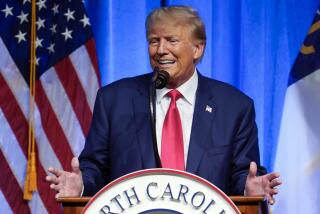Iran sanctions: U.S. and allies may narrow their approach
With Iran’s crackdown on protesters intensifying, the Obama administration and allied governments are rethinking their approach to planned sanctions in hopes of focusing the punishments more tightly on the Iranian leadership, U.S. officials say.
U.S. and allied officials have been in discussions for months about how to impose economic penalties on Tehran to discourage it from continuing with a uranium enrichment program that the West believes is aimed at developing a nuclear bomb.
But as the Iranian government’s crackdown has taken a growing toll on the opposition movement, officials are increasingly concerned that broad sanctions harming ordinary citizens would appear harsh to the outside world and would risk alienating parts of the population with which the West seeks to establish common cause.
The discussions are now aimed at making the sanctions “as narrow as they can be,” said a senior State Department official who declined to be identified because of the sensitivity of the talks.
He said he thought the new approach would rule out an international embargo on selling gasoline to Iran, which is a major producer of crude oil but which has such limited refining capacity that it imports 40% of the gasoline it uses.
Cutting off gasoline shipments has strong support in Congress and among advocates for aggressive action, but the administration and U.S. allies are likely to resist that tactic because it would have such far-reaching effects on Iran.
“That would be so broad-brush, it would be tough to do,” the official said.
The House voted 412 to 12 this month to approve a bill that would penalize companies that help provide refined petroleum products to Iran. The measure is expected to also pass the Senate.
Some foreign diplomats and private analysts have warned that Iran’s crackdown on protesters would make it much more difficult for the U.S. and other world powers to negotiate a deal with Tehran over its nuclear program because any agreement reached now would lack acceptance in the U.S. and abroad.
But the senior official said the administration had come to the conclusion that Iran had already turned its back on a deal.
“It’s off the table,” the official said.
Ray Takeyh, who was an administration advisor on Iran earlier this year, agreed that it was now desirable to make the sanctions as “discriminating and selective as possible.”
But Takeyh said that doing so would be difficult because the world has so little information on the inner workings of the Iranian economy that it is difficult to calculate the social effects of any economic sanction.
Targeting “surgically . . . may just not be possible,” he said. “And if it isn’t, you might want to rethink how you do it and whether you want to do it at all.”
Takeyh, now an Iran specialist at the Council on Foreign Relations, said that although the rise of the Iranian opposition movement had boosted the administration’s hopes for change in Iran, in the short term it had created an awkward situation.
He noted that the U.S., which has no diplomatic ties or embassy in Iran, “is probably operating with a lack of information that’s reliable.”
“They’re trying to follow a series of unpredictable events in a faraway place. And often what they say is going to be reactive,” Takeyh said.
Some analysts think the U.S. and its allies ought to wait before imposing tough new sanctions to find out whether the Iranian protests, now in their sixth month, will bring about a government more to the West’s liking.
Meanwhile, the administration has been trying to avoid repeating an action that brought it harsh criticism in June, after the disputed Iranian presidential election that led to the eruption of protests. President Obama and senior aides avoided strong criticism of the regime in the first few days after the election and were assailed for failing to support the opposition.
In recent days, the administration has spoken repeatedly of its commitment to human rights in Iran.
Obama said Monday that Iranians “have sought nothing more than to exercise their universal rights.”
“Each time they have done so, they have been met with the iron fist of brutality, even on solemn occasions and holy days.”
Trita Parsi, an Iran analyst and president of the National Iranian American Council advocacy group, said the new emphasis was part of the administration’s “course correction” that had it placing more emphasis on human rights.
More to Read
Start your day right
Sign up for Essential California for news, features and recommendations from the L.A. Times and beyond in your inbox six days a week.
You may occasionally receive promotional content from the Los Angeles Times.







